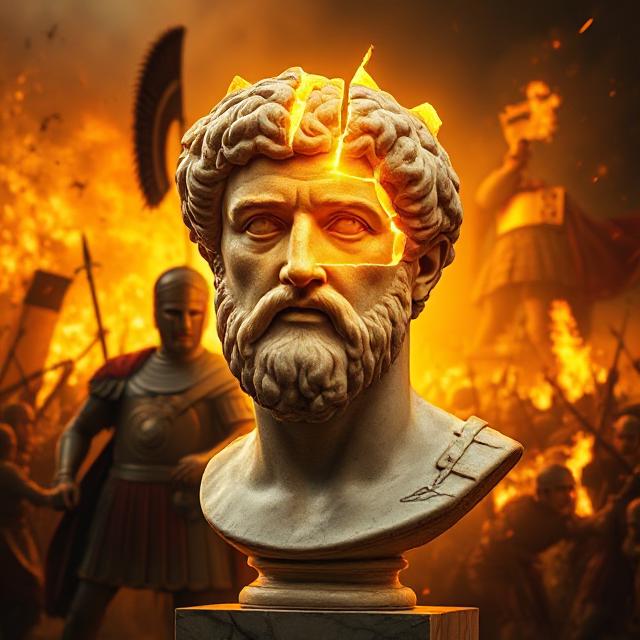
Table of Contents
Stoicism in Ancient Rome: A Philosophy for Power and Peace
“Stoicism in Ancient Rome” wasn’t just a fad—it was a cultural force that guided emperors, senators, soldiers, and slaves. What began as a Greek school of thought transformed into a cornerstone of Roman virtue, political life, and personal resilience. From its noble ascent under Seneca and Marcus Aurelius to its decline in the late Empire, the journey of Roman Stoicism tells the story of philosophy tested by power.
I. Stoicism’s Greek Roots
Stoicism originated in Athens around 300 BCE, founded by Zeno of Citium. The philosophy taught that virtue is the highest good, and that a rational life aligned with nature leads to tranquility. Key tenets included:
- Living according to reason and nature
- Emotional resilience through self-control
- Indifference to external events (apatheia)
- Acceptance of fate (amor fati)
These ideas soon traveled across the Mediterranean and found fertile ground in the Roman Republic.
II. Why Stoicism Took Root in Rome
The Romans prized practicality, discipline, and civic duty—all values compatible with Stoic teachings. As Rome expanded, Stoicism provided a moral compass for those navigating power, uncertainty, and ambition.
Unlike other Hellenistic philosophies that retreated from public life, Stoicism encouraged engagement with the world, especially in service to the common good. The Stoic could be a soldier, senator, or emperor—and many were.
III. Stoic Thinkers in Rome
1. Cato the Younger (95–46 BCE)
A model of Stoic courage and integrity, Cato resisted Julius Caesar’s authoritarian rise and died by suicide rather than submit. He embodied Roman Stoicism as a life of unwavering principle.
2. Seneca (4 BCE – 65 CE)
A statesman, playwright, and tutor to Emperor Nero, Seneca wrote extensively on ethics, self-control, and mortality. Though his wealth and political involvement drew criticism, his letters remain a Stoic treasure trove.
“We suffer more often in imagination than in reality.” — Seneca
3. Epictetus (c. 50 – 135 CE)
Born a slave, Epictetus taught freedom through mental discipline. His teachings, recorded by a student in the Discourses and Enchiridion, emphasize inner control and detachment from externals.
“It’s not what happens to you, but how you react to it that matters.”
4. Marcus Aurelius (121–180 CE)
The philosopher-emperor, Marcus Aurelius practiced Stoicism while leading Rome. His Meditations—written during military campaigns—blend introspection with moral resolve.
“You have power over your mind—not outside events. Realize this, and you will find strength.”
IV. Stoicism in Roman Institutions
Stoicism in Ancient Rome influenced not only individuals but institutions:
- Law and justice: The Stoic ideal of universal reason shaped Roman legal theory, laying foundations for modern jurisprudence.
- Education: Stoicism was part of elite training for orators, politicians, and military leaders.
- Military conduct: Discipline, endurance, and honor echoed Stoic virtues.
- Politics: The ideal Roman statesman was expected to rise above personal interests for the sake of the Republic.
V. The Decline of Stoicism in Rome
Stoicism’s decline in Ancient Rome was not due to irrelevance but to changing times and rising ideologies.
1. Shift to Christianity
As Christianity spread, it replaced Stoicism as the dominant moral framework. Unlike Stoicism, which saw the universe as divine but impersonal, Christianity offered a personal God, grace, and salvation—answers to emotional needs Stoicism couldn’t fully meet.
2. Imperial Decay and Disillusionment
The crises of the late Empire—plague, war, corruption—disillusioned many. Philosophical idealism gave way to fatalism or religious zeal. The Stoic model of the rational citizen seemed obsolete in a fractured world.
3. Internal Contradictions
Critics of Stoicism pointed out its tensions:
- Can you truly remain indifferent to all externals?
- Does radical self-control risk emotional repression?
- Can Stoic ethics work for the masses, or only elites?
As a result, Stoicism faded as a public philosophy but lived on in texts and isolated practice.
VI. The Enduring Legacy
Though Stoicism in Ancient Rome faded politically, its influence endures:
- Modern Stoicism is thriving, from self-help to leadership training.
- Cognitive Behavioral Therapy (CBT) echoes Stoic ideas of challenging irrational beliefs.
- Military and crisis professionals use Stoic mindset training.
- Entrepreneurs and athletes cite Stoic writings for discipline and focus.
Books like Meditations, Letters to Lucilius, and Enchiridion are widely read again, showing that Stoicism’s fall was not a death—it was a transformation.
VII. Conclusion: A Philosophy for Empire and Inner Peace
“Stoicism in Ancient Rome” is the story of a philosophy adapted for action. It offered strength without cruelty, power without ego, and reason without detachment. It rose with the Republic, flourished with the Empire, and quietly stepped aside as new eras dawned.
But it never vanished. Today, when modern life feels overwhelming, Roman Stoicism whispers again:
“Focus on what you can control. Endure what you must. Live by reason, and live free.”
